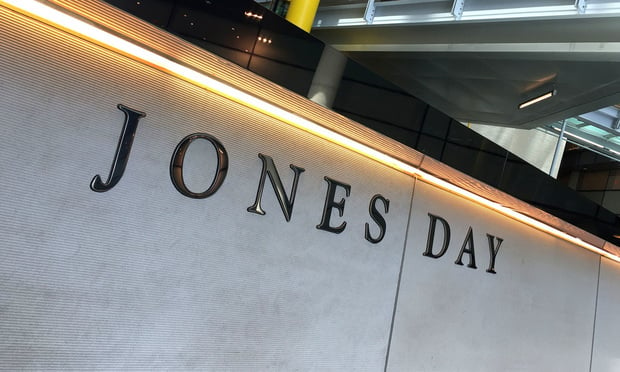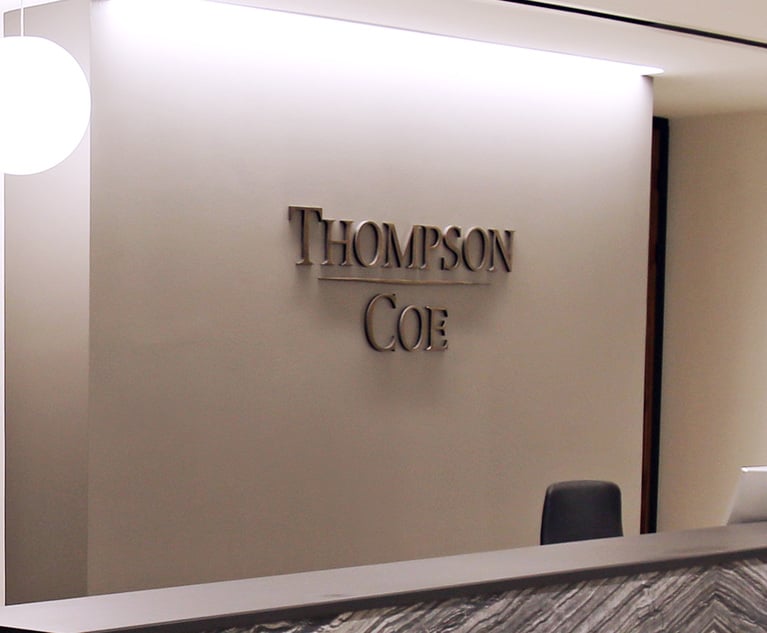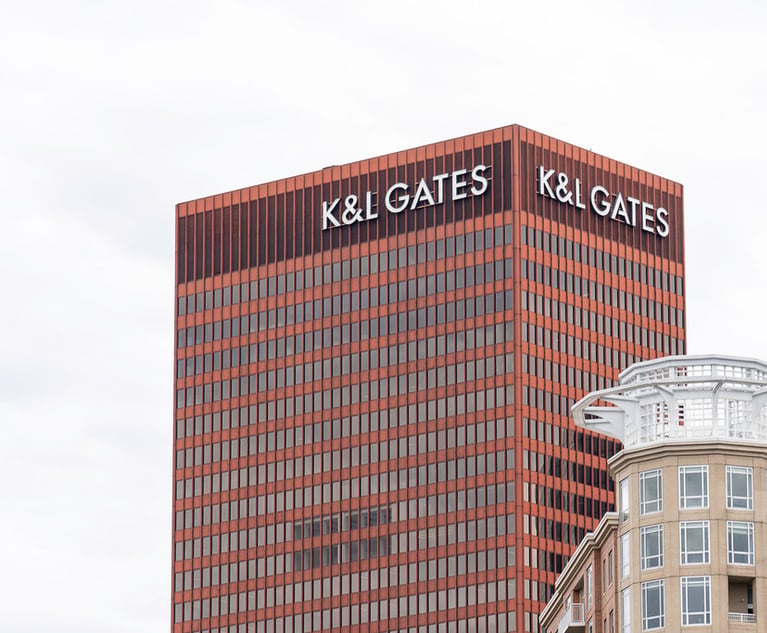Jones Day Presses Plaintiffs to Go Public in Gender Bias Case
The firm, representing itself, says a federal judge erred in letting four female former associates hide behind pseudonyms when they leveled accusations of widespread gender discrimination.
May 20, 2019 at 03:49 PM
5 minute read
 Jones Day's offices in Washington, D.C. (Photo: Diego M. Radzinschi/ALM)
Jones Day's offices in Washington, D.C. (Photo: Diego M. Radzinschi/ALM)
Jones Day is once again relying on its own lawyers to fight accusations of systematic gender bias within the firm.
Just as it did in a 2018 lawsuit brought by former partner Wendy Moore, the firm is deploying its own talent to ward off a proposed class action suit by six female former associates who claimed in an April complaint that Jones Day's “black box” compensation model, leadership structure and culture serve to systematically deny women equal pay and opportunity for advancement.
The firm revealed its defense team in a filing in Washington, D.C., federal court Monday that argued four women in the April suit should not be allowed to proceed pseudonymously.
“The Jane Does are not materially different from the countless employment discrimination plaintiffs who routinely file under their real names, including the named plaintiffs here who, rather than fearing publicity, have invited extensive media attention to themselves and their claims,” the firm said in a motion asserting the women misled the court in securing anonymity.
Jones Day has tapped two of its highest profile female attorneys—issues and appeals practice leader Beth Heifetz, Europe partner-in-charge Mary Ellen Powers, both of whom are based in Washington—to defend the lawsuit. Also on the team is New York-based employment partner Terri Chase.
The firm previously cited Heifetz as an example of its female friendly polices in a rebuttal to the lawsuit posted on its website, noting that she became the practice leader while working part-time after returning from a multiyear family leave.
The American Lawyer reported in June 2018 that Jones Day enlisted San Francisco of counsel Robert Mittelstaedt to defend against Wendy Moore's separate state court lawsuit against the firm. Jones Day has succeeded in placing that suit, filed in San Francisco state court, under seal, and current counsel information is unavailable to the public.
In both suits, plaintiffs are represented by Sanford Heisler Sharp.
In the most recent suit, former Irvine, California associates Nilab Rahyar Tolton and Andrea Mazingo put their name in the complaint. Four other women, two of whom also worked in California, secured permission from Chief Judge Beryl Howell of the U.S. District Court for the District of Columbia, to use pseudonyms
On Monday, the firm said this decision was made in error.
“For one thing, the court's approval of the pseudonyms itself impugns Jones Day's reputation by implying, without basis in evidence, that Jones Day would improperly retaliate against the Jane Does if their identities were made public,” the motion said. “For another, pseudonyms prevent the public—including clients, potential clients, lateral recruits, and law students—from fully evaluating the Does' allegations and credibility.”
Jones Day also said that the plaintiffs' public relations strategy surrounding the lawsuit made protecting the identity of the four plaintiffs particularly inappropriate. The firm noted that while it has yet to be served with the complaint, the plaintiffs gave it to the media before it was filed, and the two other plaintiffs have spoken to the press about their reasons for bringing the suit. This, according to Jones Day, is unfair to both the firm and the public, who can't assess the credibility of sources who are publicly attacking the firm without knowing their identity.
“Waging a public relations war is plainly a key part of plaintiffs' litigation strategy,” it said.
Jones Day also argued that the anonymity of its accusers is already hobbling its defense, noting that without knowing who the women are, it can't identify what witnesses within the firm to interview, nor do these witnesses know to come forward.
The firm sought to bolster its argument by referencing another high-profile gender bias suit brought by Sanford Heisler Sharp, in which six Jane Does have accused Morrison & Foerster of routinely holding back mothers and pregnant women. While that firm did not resist the plaintiffs' motion to file under pseudonyms, in a recent hearing, U.S. Magistrate Judge Jacqueline Scott Corley of the U.S. District Court for the Northern District of California suggested that the women suing the firm were not entitled to anonymity, as their career prospects were no more threatened by being part of a lawsuit than any other employment plaintiff.
Jones Day also noted that, at that same hearing, the judge questioned how any potential class member could make a decision about joining a class action suit without knowing the identity of the class representative, a point that does not fully transfer to the most recent lawsuit, where the identity of two class representatives is public.
The identity of the Morrison & Foerster plaintiffs remains under wraps, thanks to the defense's lack of objections, but at the end of the hearing, the judge warned that they will at some point be forced to go public.
On Monday afternoon, U.S. District Judge Randolph Moss of the District of Columbia ordered the plaintiffs to respond to Jones Day's motion by Thursday. Attorneys from Sanford Heisler Sharp did not immediately respond to a request for comment Monday.
This content has been archived. It is available through our partners, LexisNexis® and Bloomberg Law.
To view this content, please continue to their sites.
Not a Lexis Subscriber?
Subscribe Now
Not a Bloomberg Law Subscriber?
Subscribe Now
NOT FOR REPRINT
© 2025 ALM Global, LLC, All Rights Reserved. Request academic re-use from www.copyright.com. All other uses, submit a request to [email protected]. For more information visit Asset & Logo Licensing.
You Might Like
View All
KPMG Wants to Provide Legal Services in the US. Now All Eyes Are on Their Big Four Peers



K&L Gates Sheds Space, but Will Stay in Flagship Pittsburgh Office After Lease Renewal
Trending Stories
- 1'It's Not Going to Be Pretty': PayPal, Capital One Face Novel Class Actions Over 'Poaching' Commissions Owed Influencers
- 211th Circuit Rejects Trump's Emergency Request as DOJ Prepares to Release Special Counsel's Final Report
- 3Supreme Court Takes Up Challenge to ACA Task Force
- 4'Tragedy of Unspeakable Proportions:' Could Edison, DWP, Face Lawsuits Over LA Wildfires?
- 5Meta Pulls Plug on DEI Programs
Who Got The Work
Michael G. Bongiorno, Andrew Scott Dulberg and Elizabeth E. Driscoll from Wilmer Cutler Pickering Hale and Dorr have stepped in to represent Symbotic Inc., an A.I.-enabled technology platform that focuses on increasing supply chain efficiency, and other defendants in a pending shareholder derivative lawsuit. The case, filed Oct. 2 in Massachusetts District Court by the Brown Law Firm on behalf of Stephen Austen, accuses certain officers and directors of misleading investors in regard to Symbotic's potential for margin growth by failing to disclose that the company was not equipped to timely deploy its systems or manage expenses through project delays. The case, assigned to U.S. District Judge Nathaniel M. Gorton, is 1:24-cv-12522, Austen v. Cohen et al.
Who Got The Work
Edmund Polubinski and Marie Killmond of Davis Polk & Wardwell have entered appearances for data platform software development company MongoDB and other defendants in a pending shareholder derivative lawsuit. The action, filed Oct. 7 in New York Southern District Court by the Brown Law Firm, accuses the company's directors and/or officers of falsely expressing confidence in the company’s restructuring of its sales incentive plan and downplaying the severity of decreases in its upfront commitments. The case is 1:24-cv-07594, Roy v. Ittycheria et al.
Who Got The Work
Amy O. Bruchs and Kurt F. Ellison of Michael Best & Friedrich have entered appearances for Epic Systems Corp. in a pending employment discrimination lawsuit. The suit was filed Sept. 7 in Wisconsin Western District Court by Levine Eisberner LLC and Siri & Glimstad on behalf of a project manager who claims that he was wrongfully terminated after applying for a religious exemption to the defendant's COVID-19 vaccine mandate. The case, assigned to U.S. Magistrate Judge Anita Marie Boor, is 3:24-cv-00630, Secker, Nathan v. Epic Systems Corporation.
Who Got The Work
David X. Sullivan, Thomas J. Finn and Gregory A. Hall from McCarter & English have entered appearances for Sunrun Installation Services in a pending civil rights lawsuit. The complaint was filed Sept. 4 in Connecticut District Court by attorney Robert M. Berke on behalf of former employee George Edward Steins, who was arrested and charged with employing an unregistered home improvement salesperson. The complaint alleges that had Sunrun informed the Connecticut Department of Consumer Protection that the plaintiff's employment had ended in 2017 and that he no longer held Sunrun's home improvement contractor license, he would not have been hit with charges, which were dismissed in May 2024. The case, assigned to U.S. District Judge Jeffrey A. Meyer, is 3:24-cv-01423, Steins v. Sunrun, Inc. et al.
Who Got The Work
Greenberg Traurig shareholder Joshua L. Raskin has entered an appearance for boohoo.com UK Ltd. in a pending patent infringement lawsuit. The suit, filed Sept. 3 in Texas Eastern District Court by Rozier Hardt McDonough on behalf of Alto Dynamics, asserts five patents related to an online shopping platform. The case, assigned to U.S. District Judge Rodney Gilstrap, is 2:24-cv-00719, Alto Dynamics, LLC v. boohoo.com UK Limited.
Featured Firms
Law Offices of Gary Martin Hays & Associates, P.C.
(470) 294-1674
Law Offices of Mark E. Salomone
(857) 444-6468
Smith & Hassler
(713) 739-1250










